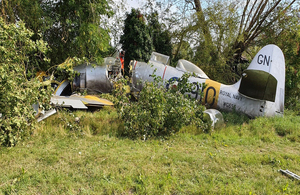News story
The engine oil temperature rose and the oil pressure started to fluctuate. The engine then seized, forcing the pilot to make a landing in a field near Button End, Cambridgeshire, 4 August 2020

During the second flight of Hawker Sea Fury T MK.20 (G-INVN) following maintenance, the engine oil temperature rose and the oil pressure started to fluctuate. The engine then seized, forcing the pilot to make a landing in a field. The aircraft was extensively damaged and both occupants suffered serious injuries.
Examination of the engine revealed extensive internal damage which resulted from the failure of a main engine bearing. The cause of the bearing failure could not be identified but the investigation determined that contamination of the oil system was the most likely cause. The investigation has not identified the need for new safety recommendations, but three areas for additional consideration by operators of similar aircraft are highlighted:
• An engine oil chip detector may provide sufficient early warning of engine damage to indicate the need for remedial maintenance before further flight.
• Forced landing or abandonment involves significant risk of injury in high performance aircraft. Operators and pilots can promote safe outcomes by providing clear safety briefings and ensuring all occupants wear effective head protection, as in this case.
• Training in a relevant simulator can help familiarise pilots with prioritising the tasks necessary to conduct a safe forced landing, including the importance of maintaining sufficient airspeed, field selection, and the passenger and other emergency procedures that must be completed. The AAIB recognises that there are few such simulators for high performance piston driven aircraft, and alternative means of achieving the same training aims may also be beneficial.
Media enquiries call: 01932 440015 or 07814 812293
Published 16 September 2021
Follow this news feed: HM Government





